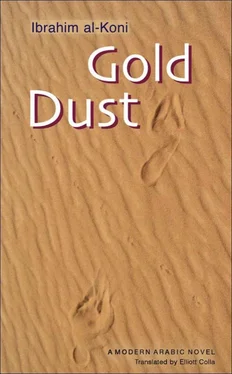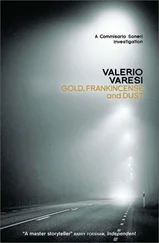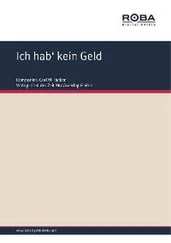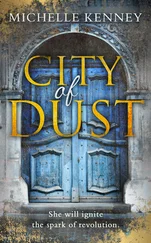A few days later, Ukhayyad began to talk. He spoke to the old man about the piebald, “Did you know he was a piebald? Have you ever seen a piebald Mahri in the desert? Don’t pay any attention to his condition right now — it’s just a passing sickness. His original colors will come back. They have to come back.”
The herders exchanged looks among themselves. The old herder watched him with intense curiosity, then smiled a benign smile. The smile of one who has seen much in the world.
Ukhayyad asked abruptly, “Do you think he’s lost his original color?”
The old man said, while pouring tea from one pot to another, “Lord only knows. The Sufi sheikhs of Ghadamès say that everything returns to its original form in the end. The seedling grows into the broom tree. The broom tree blossoms. Its flowers turn to fruit. Fruit brings forth seeds which fall to the ground. If his original form was piebald, then that color will return to his form in time. Be patient, and do not fear.”
Then he smiled again.
“If his colors don’t return, his health will have no meaning,” Ukhayyad replied, impatiently. “His cure has already cost us so much.”
“Would you have preferred to purchase his health without suffering?”
“Without his dappled color, he has no health.” His fear that the Mahri might have lost his original color for good stuck in his throat. He forgot the sweet taste of health and rescue from death. The herders clothed him and gave him a veil and supplies. They escorted him as far as the end of the Hamada desert. There, they bid him farewell and returned to the lower valleys where they made their camps.
Shame prevented Ukhayyad from bringing the piebald into the camp while he was in this state. Using a cord the herders had given him, Ukhayyad tethered him in a pasture just north of the plain where his kin’s encampments stretched far and wide.
Of all his belongings, nothing remained but the reins. He coiled them around his wrist, determined to preserve them as a memento of his journey. They consisted of a polished strap, painstakingly braided and branded with geometric designs that had faded from long use. That thin leather strap had been the sole material connecting him to life, the cord that took him from his purgatory, where he hovered in the shadows, and delivered him back to the desert again. It was the thread that had bound him to the piebald during that first mad journey and had joined their destinies. It had held him again during his second journey that stretched between the mouth of the well to the surface of the waters. These reins marked that distance between one reality and the other. They embodied the threshold where he had heard the howls of the she-jinn of Jebel Hasawna and where he had seen the houris of paradise. In these reins was distilled the moment in which he was given drink from heaven’s stream. In them was also an eon that measured the whole of his life in the desert. The reins marked the moment when he tumbled headlong into an abyss, lighting his soul with a dark flame that would never go out. Without this thread connecting one extreme and the other, that mystical moment would never have come into being. Without this thread, he would never have seen that mysterious spark whose kernel he was unable to divulge, even to himself. Is this spark what wine drinkers see in their moment of abandon? Is it what the Sufi sheikhs of the Tijaniya brotherhood referred to when they spoke of their encounter with God? He had seen dervishes in the Adrar oasis, spinning wildly when suddenly one of them flew into ecstasy. The man had pulled out his knife and plunged it into his chest, expecting to complete the journey back to God, hoping to savor an encounter with the infinite. Sheikhs, like Sheikh Musa of the Qadiriya sect, accused the Tijanis of heresy and fought them wherever they met. War broke out from time to time between adherents of the two sects. The hostilities had even reached far into the desert wilderness itself, carried to the distant pastures by wandering dervishes and itinerant travelers who accompanied the long-distance caravans. Had he seen a vision of this magnificent fate in that flash of a moment?
The sheikh visited him in the tent Ukhayyad’s father had erected specially for receiving the visitors and well-wishers who came to congratulate him on his safe return from the vast, labyrinthine desert. The sheikh said, “A beautiful thing can be bought only at great price. And health is the most beautiful thing in this world. So, have no regrets about what you have been through.”
At nightfall, the two went off alone into the open desert. “Did you suffer much?” The sheikh asked, seeking to comfort him.
Ukhayyad did not answer. Something else was worrying him. Impatient, he asked, “Will the piebald go back to his original state?”
The sheikh asked him to explain with a nod of his head. The young man asked more bluntly, “Will his color return?”
“God is beautiful and He loves beauty and camels,” Musa smiled in the twilight. “You’ve paid for his cure with much suffering. If it is perfection you want, then you will have to pay for that as well.”
Ukhayyad did not understand. The sheikh clarified, “Think about it. He needs to be cleansed.”
“Cleansed?”
“Purified — he needs to be gelded.”
“Gelded?”
“What else? Didn’t we agree that everything has its price?”
“. .”
“His whole body carries the mark of sin. His body is an offense in itself. We need to remove the cause at the root.”
The young man stood silent. “I cannot come to this decision by myself,” he eventually said. “I need to consult with others. I have to think about it some.”
Then Ukhayyad turned and disappeared into the darkness.
The harm you’ve caused us was enough,” Ukhayyad said when he and the camel were off by themselves again in the pasture. “Women cause nothing but headaches, don’t they?” By now, the camel’s new skin had toughened, and his wounds had mended. The ghastly redness had disappeared. But the camel’s coat had yet to grow back. When the Mahri did not comment on his proposition, the young men continued: “Sheikh Musa says the root cause must be removed. Splendor is no easy thing to attain, everything demands its own sacrifice. You won’t be in pain for long. We will do it during the summer. Summer is the best season for it.”
Agitated, the piebald reared his head. Was this his way of showing that he rejected the idea? “No, no — wait,” Ukhayyad blurted out. “Don’t rush into decisions that you’ll later regret. What happened to you should never have happened. Warriors have no business contracting contagious skin diseases. Purebreds should not allow themselves to get mange. Have you seen any other piebald with mange? You’re a splendid creature, you’re beautiful. But beauty can’t be bought with mere money. For your looks, I am ready to pay with my life. To be the most beautiful thoroughbred in the Sahara — you have no idea what that would be like. Do you think I would ever do something that would cause you harm? Do you have so little trust in me?”
The piebald opened his jaws as wide as they would go. The outlines of a wicked laugh twinkled in his keen eyes. “I get it,” Ukhayyad also laughed. “You mean to say that females are more beautiful still! No — don’t lie, by God! Women are beautiful, yes. Even lovely. But so are snakes. And like snakes, they bite. You’ve been bitten by one, and look what her venom did to you the last time. Wasn’t that enough? Have some shame — turn your back on the ways of the Devil!”
He stroked the Mahri’s neck and inspected his hide, whispering, “When we get through this ordeal, we’ll begin something new. We’ll learn how to dance. Purebred camels must know how to dance, and you have never tried. It’ll make you forget all about love. Trust me. You’ll soar through the air, and sail through the heavens. It’s more dignified to see God in heaven, isn’t it, than to chase after silly she-camels on earth?”
Читать дальше












